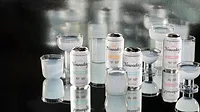Cadbury Schweppes to Spin off Beverage Unit
Cadbury Schweppes to Spin Off Beverage Unit
Cadbury Schweppes announced that it intends to separate its confectionery and Americas Beverages businesses. In a statement, company Chairman John Sunderland said: "This decision is of great significance for the board and the company. It has been facilitated by acquisitions and disposals over the last decade designed to create a strong and potentially independent Americas Beverages business. In the same time, we have built the world's largest confectionery business. We believe now is the moment to separate and give both management teams the focused opportunity to extract the full potential inherent in these excellent businesses."
A possible spin-off has been anticipated since Cadbury
already has divested most of its beverage businesses outside of the United
States. It sold its beverage holdings in Europe, Syria and South Africa
last year. The company says the time is right to spin off the American
business after improving its distribution and brand performance.
“We have actively sought to significantly
improve the performance of our business in the Americas over the last three
years, first through restructuring and then by a focus on core
brands,” the company said. “This culminated in 2006 when we
secured and strengthened our route to market through the acquisition of
several of our third party bottlers (including Dr Pepper/Seven Up Bottling
Group).”
The company said it will announce more specific plans
for separating its businesses during its June financial update.
CCNA to re-organize
Coca-Cola North America
will change its organizational structure into three units: sparkling
beverages, still beverages and emerging beverages. Sandy Douglas will
continue leadership of the North American division. The emerging beverage
division will be led by Deryck van Rensburg who formerly headed
Coca-Cola’s Germany division. The still beverages unit will be headed by Brian Kelley, who previously as
chief executive officer of SIRVA, a relocation company. The company had not
named a leader for the sparkling beverage division at presstime.
“We believe the reorganization is a move by The
Coca-Cola Co. to address the tough operating environment ahead for its
North America region as well as a move to address CCE’s desire for
additional innovation in the non-carbonated beverage category,” said
Citigroup Wall Street analyst Bonnie Herzog, in a report.
“The creation of a new emerging beverage
division allows [Coca-Cola] to be more nimble on product innovation and
acquisitions,” she added.
Coca-Cola also reached an agreement last month that
will end the lawsuit filed by some of its bottlers over warehouse
distribution of Powerade. The agreement calls for the company to work with
the bottlers to develop and test new customer service and distribution
systems to supplement the direct store delivery system.
“Our bottling system is our heritage and it will
be the foundation of our future growth,” Douglas said. “The
partnership with our bottlers is what makes the Coca-Cola system powerful
and unique, and we will work diligently to ensure that we move forward and
succeed together. One of the historic strengths of our system has been its
ability to change and adapt as our consumers, customers and competitors
have changed. By working together on new customer service and distribution
systems, we will ensure that our systems second
century is as bright as ever.”
Nestlé enters the Magic Kingdom
Nestle’s Nesquik
products will now be included in the healthy eating initiative the Walt
Disney Co. unveiled last fall. Restaurants at the Disneyland Resort will
offer Nesquik Chocolate and Strawberry 100 percent flavored milk, water,
100 percent fruit juice or plain low-fat milk as beverages with kids’
meals.
“We’re proud to be a part of
Disney’s steps toward better nutrition for kids,” said Cathy
Dean, marketing manager for Nestle Nesquik RTD. “We share
Disney’s commitment to providing healthier options for children and
families, whether at school, on vacation at Disneyland, or on the go.
“We introduced the 8-ounce package in June 2006,
specifically to provide portion options for parents and kids,” she
added. “As the leading brand of flavored milk with 85 percent of
national branded sales, we want to help our customers by providing options
for a balanced lifestyle.”
In Disney’s initial tests involving 20,000
kids’ meals, as many as 90 percent of parents and children stayed
with more nutritious food and beverage options, the company says.
Spanish court denies Bacardi’s rights to Havana
Club
Bacardi was denied the brand ownership claim to the Havana Club trademark by the
Provincial Court of Madrid, Spain. The recent ruling by the appeals court
stemmed from Bacardi’s 1999 complaint petitioning for recognition as
owner of the trademark for Havana Club rums in Spain. Cuban-based Havana
Club International, which is affiliated with Pernod Ricard, holds the
Havana Club trademark for Spain and many other countries.
Bacardi filed the complaint because it had purchased
the rights to the Spanish Havana Club trademark from former shareholders of
JASA, a Cuban company that had registered a Spanish trademark in 1935, but
had not renewed or used the brand name in Spain. Havana Club International,
which was formed by a partnership between
Corporation Cuba Ron S.A. and Pernod Ricard in 1993, markets dark aged rums
in Spain under the brand name.
The court also ruled using “Havana” or
other Cuban terms for a non-Cuban product would mislead consumers regarding
the product’s origin. Bacardi launched Havana Club rum, made in
Puerto Rico, in the United States in September 2006.
IBWA teams with Pack Expo
The International Bottled
Water Association (IBWA), Arlington, Va., announced it will hold its 2007
Convention and Tabletop Trade Show in conjunction with Pack Expo 2007. The
IBWA Convention and Show will be held Oct. 15-19 at the Las Vegas Hilton
Hotel adjacent to the Packaging Machinery Manufacturers Institute’s
Pack Expo show.
Its new Tabletop Trade Show will debut this year and
will provide the same networking opportunities as past events, but in a
more intimate atmosphere. The convention also will provide an expanded
seminar program to educate bottled water professionals on innovative
technologies, processes, marketing and sales techniques as well as industry
trends. IBWA attendees will receive complimentary access to Pack Expo,
which also is co-located with Process Expo and the Converting and Package
Printing Expo (CPP).
The association also released an Emergency Response
Directory, which is a list of organizations and government agencies
responsible for emergency and disaster response activities.
The directory is a resource for IBWA members and other
interested parties to find the proper national, regional, state and local
groups to provide bottled water and other resources to those in need during
an emergency. It was created by the association’s Emergency
Clearinghouse Working Group, which was founded in 2005 following Hurricanes
Katrina and Rita, and can be downloaded from on the IBWA Web site,
www.bottledwater.org
Absolut on the market
The Swedish government is putting Absolut Vodka up for sale after nearly
90 years of ownership. The estimated price of Absolut-maker V&S Vin
& Sprit is $5.7 billion, according to reports, and companies such as
Bacardi have expressed interest in acquiring the brand.
The sale of Absolut is thought to be driven by the
perception of conflict between state ownership of a liquor brand in a
country that closely controls alcohol sales.
Looking for a reprint of this article?
From high-res PDFs to custom plaques, order your copy today!






